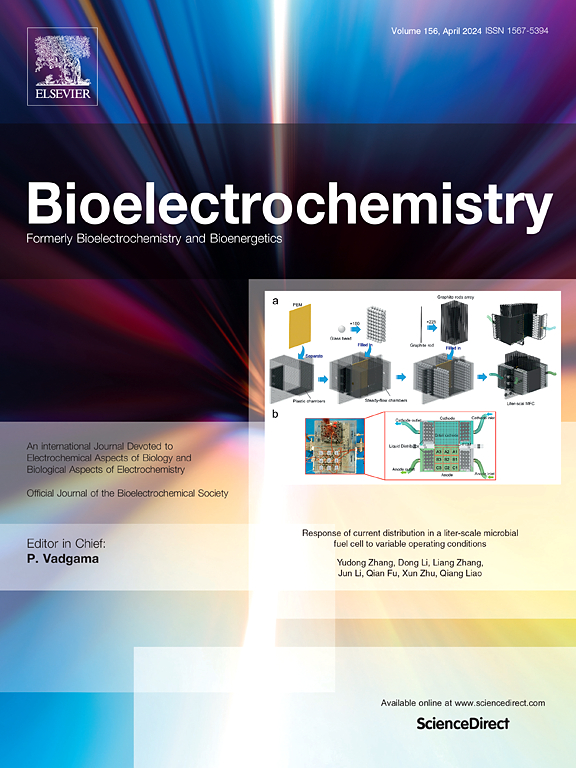Numerical modeling of giant pore formation in vesicles under msPEF-induced electroporation: Role of charging time and waveform
IF 4.8
2区 化学
Q1 BIOCHEMISTRY & MOLECULAR BIOLOGY
引用次数: 0
Abstract
Giant unilamellar vesicle is the closest prototypical model for investigating membrane electrodeformation and electroporation in biological cells. This work employs numerical simulations to investigate the effect of membrane charging time on vesicle electroporation under milli-second pulsed-electric-field (msPEF) of different waveforms. Our numerical approach, which implements the effect of electric stretching on membrane tension and precise calculation of pore energy, successfully predicts the formation of giant pores of size as observed in previous experiments. The poration zone is found to extend up to certain angles as measured from the poles, termed critical angles. An increase in charging time delays pore formation, decreases the pore density, and trims down the poration zone. Counterintuitively, this effect promotes significant pore growth. Moreover, there exists a cut-off charging time above which pore formation is completely inhibited. This phenomenon is particularly pronounced with square bipolar pulses. Comparisons with the previous experimental results reveal that electrodeformation-poration-induced membrane surface area variation and that induced only by electroporation evolves in a similar fashion. Therefore, although the agreements are qualitative, the present electroporation model can be used as the simplest tool to predict the evolution of vesicles under electric pulses in laboratory experiments.
mspef诱导电穿孔下囊泡大孔形成的数值模拟:充电时间和波形的作用
巨型单层囊泡是研究生物细胞中膜电变形和电穿孔的最接近的原型模型。本文采用数值模拟的方法研究了不同波形毫秒脉冲电场(msPEF)作用下膜充电时间对囊泡电穿孔的影响。我们的数值方法实现了电拉伸对膜张力的影响,并精确计算了孔隙能量,成功地预测了0 (1)μm大小的大孔隙的形成。人们发现,从两极开始测量,气孔区延伸到一定角度,称为临界角。充电时间的增加延迟了孔隙的形成,降低了孔隙密度,缩小了孔隙区。与直觉相反,这种效应促进了显著的孔隙生长。此外,存在一个截止充注时间,超过该时间孔隙形成完全被抑制。这种现象在方形双极脉冲中尤为明显。与以往实验结果的比较表明,电变形穿孔引起的膜表面积变化与仅电穿孔引起的膜表面积变化具有相似的演变方式。因此,虽然一致性是定性的,但目前的电穿孔模型可以作为实验室实验中预测电脉冲作用下囊泡演化的最简单工具。
本文章由计算机程序翻译,如有差异,请以英文原文为准。
求助全文
约1分钟内获得全文
求助全文
来源期刊

Bioelectrochemistry
生物-电化学
CiteScore
9.10
自引率
6.00%
发文量
238
审稿时长
38 days
期刊介绍:
An International Journal Devoted to Electrochemical Aspects of Biology and Biological Aspects of Electrochemistry
Bioelectrochemistry is an international journal devoted to electrochemical principles in biology and biological aspects of electrochemistry. It publishes experimental and theoretical papers dealing with the electrochemical aspects of:
• Electrified interfaces (electric double layers, adsorption, electron transfer, protein electrochemistry, basic principles of biosensors, biosensor interfaces and bio-nanosensor design and construction.
• Electric and magnetic field effects (field-dependent processes, field interactions with molecules, intramolecular field effects, sensory systems for electric and magnetic fields, molecular and cellular mechanisms)
• Bioenergetics and signal transduction (energy conversion, photosynthetic and visual membranes)
• Biomembranes and model membranes (thermodynamics and mechanics, membrane transport, electroporation, fusion and insertion)
• Electrochemical applications in medicine and biotechnology (drug delivery and gene transfer to cells and tissues, iontophoresis, skin electroporation, injury and repair).
• Organization and use of arrays in-vitro and in-vivo, including as part of feedback control.
• Electrochemical interrogation of biofilms as generated by microorganisms and tissue reaction associated with medical implants.
 求助内容:
求助内容: 应助结果提醒方式:
应助结果提醒方式:


